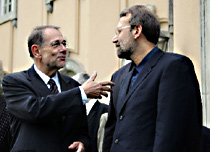
Iran's chief nuclear negotiator Ali Larijani (R) and EU
foreign policy chief Javier Solana are seen in Berlin prior to talks about
Iran's disputed nuclear program, yesterday. -Xinhua/AFP
The talks between Iranian and European Union (EU) envoys here had achieved
some progress, EU foreign policy chief Javier Solana said yesterday.
Iran's chief nuclear negotiator Ali Larijani and Solana continued their talks
on Thursday after their initial discussions had achieved no results on Wednesday
night.
Speaking to reporters after a second round on Thursday morning, Larijani made
a similar comment, saying that all the topics had been discussed and there had
been "some positive outcomes."
However, neither of them gave any further details.
"We hope to be able to embark on the main negotiations as soon as possible,"
Larijani said.
Larijani is also expected to meet German Foreign Minister Frank-Walter
Steinmeier later in the day.
"This meeting forms part of our effort to find a diplomatic solution in the
conflict over Iran's nuclear program," said German Foreign Office spokesman
Martin Jaeger earlier on Wednesday.
The talks between the two have been regarded as a last chance for Iran to
agree to a suspension of its uranium enrichment activities.
In Washington, U.S. Secretary of State Condoleezza Rice had a telephone call
with Solana before the meeting started.
"Obviously, if we can come out of this with an Iranian decision to suspend
its enrichment and reprocessing activities, completely and verifiably, then we
would be on course for negotiations and that is the course we would all like to
pursue," she told reporters.
"But I did wish Javier Solana luck and we are all awaiting the outcome of his
discussion," she added.
If the talks should fail, Iran may face sanctions from the UN Security
Council.
The five permanent Security Council members plus Germany had previously urged
Iran to accept a package of incentives for halting its enrichment activities.
However, the demand was rejected by Iran. In Tehran, Iranian President
Mahmoud Ahmadinejad told a seminar on Wednesday that Iran would "not back down"
on its nuclear rights.
"They want to use suspension (as a measure) for propaganda, then tell the
whole world that Iran was forced by them to accept suspension," the president
was quoted as saying.
"They are making a mistake and the Iranian nation will not back down on its
rights," he asserted.



